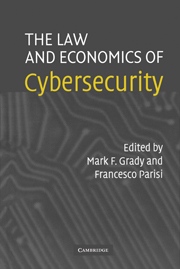Book contents
- Frontmatter
- Contents
- Acknowledgments
- Contributors
- The Law and Economics of Cybersecurity: An Introduction
- PART ONE PROBLEMS
- 1 Private versus Social Incentives in Cybersecurity: Law and Economics
- 2 A Model for When Disclosure Helps Security: What Is Different about Computer and Network Security?
- 3 Peer Production of Survivable Critical Infrastructures
- 4 Cybersecurity: Of Heterogeneity and Autarky
- PART TWO SOLUTIONS
- Index
- References
4 - Cybersecurity: Of Heterogeneity and Autarky
Published online by Cambridge University Press: 18 August 2009
- Frontmatter
- Contents
- Acknowledgments
- Contributors
- The Law and Economics of Cybersecurity: An Introduction
- PART ONE PROBLEMS
- 1 Private versus Social Incentives in Cybersecurity: Law and Economics
- 2 A Model for When Disclosure Helps Security: What Is Different about Computer and Network Security?
- 3 Peer Production of Survivable Critical Infrastructures
- 4 Cybersecurity: Of Heterogeneity and Autarky
- PART TWO SOLUTIONS
- Index
- References
Summary
The Internet is an almost organic mix of actors and their machines, an eclectic scheme of government and private decision-making, of nonprofits and for-profits. As in any integrated system, my choices affect your life in a very direct way. So “Zombie PC Army Responsible for Big-Name Web Blackout” sounds like a headline from a bad Hollywood B movie when instead it means that computer users could not access the websites of Apple, Google, Microsoft and Yahoo because a Trojan horse program – which, by definition, had been placed surreptitiously on thousands of personal computers, turning those machines into zombie computers under the control of their cybermaster – launched a simultaneous attack on a key piece of the domain name system infrastructure (Lemos and Hu 2004). Here we have perhaps one bad actor, thousands of sloppy computer users, and externalities galore.
Taking down prominent websites is one way for a malicious computer programmer to seek fame (perhaps infamy), but spam provides perhaps a more meaningful way in which the day-to-day computer experience is degraded by our shared network decisions. Some estimates suggest that 80% of spam arises from zombie machines (Sandvine Inc. 2004). Many of these are residential PCs with broadband hookups. Why? This is the dark side of Yochai Benkler's (2004) work on shareable goods. From the consumer's perspective, both the PC and the broadband connection are shareable goods. Given the lumpiness of processing power, the average PC user has power to spare.
- Type
- Chapter
- Information
- The Law and Economics of Cybersecurity , pp. 115 - 140Publisher: Cambridge University PressPrint publication year: 2005

